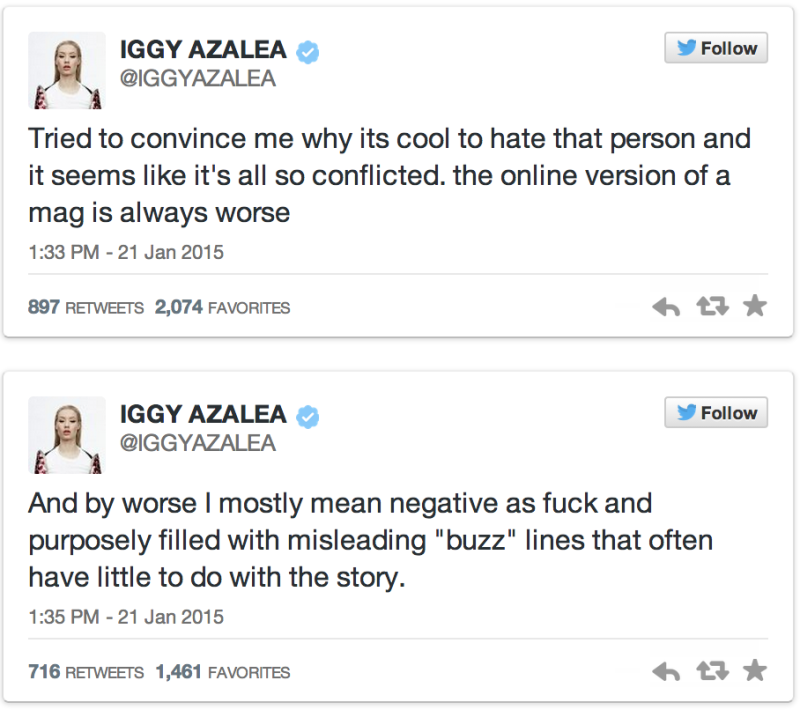
Iggy Azalea recently went on Twitter to share some thoughts. She has a tendency to do this! Sometimes it lands her in a big pile of marsupial shit. Most recently, she found herself being applauded for her "stunningly perceptive" thoughts about the media. And while I'm glad the Internet still has enough nuance to not write a person off entirely based on their previous "works"—and make no mistake, Twitter is filled with works of a performative art—Iggy's thoughts on media were myopic and half-baked. They were not "stunningly perceptive." But by all means, let's review!
First, Iggy shouted out a Pando Daily essay about someone who hates the Internet.
[I have no problem with this except to say that if you hate the Internet, you should either do something to change it, or get off of it, or spend less time on it so there's one less thing to hate in your life. Also, hilariously, Pando Daily is one of the reasons you should hate the Internet and the contemporary state of media, but that's another thing altogether.]
Then she noted that she suspects there's "always" disconnect between print magazines and their websites.
Print magazines always have a massive disconnect from their online pressnce. I don't even think the print editor oversees the online site.
— IGGY AZALEA (@IGGYAZALEA) January 21, 2015Christ on a cookie! Is it really so perceptive to think that an editor to oversee print production and another, separate editor to oversee a web production would not ideally be the same, single person? Maybe it is! But okay, let me speak from experience about how this works:
- Here at Complex, our editor-in-chief is constantly sending us emails about both. Sometimes, we print these emails out! He oversees both print and web products and tells us when they're shitty and when they're great. Same with video! All of the editors of the various channels of Complex (Pop Culture, Music, Sports, Style, et al) and websites (Pigeons & Planes, First We Feast, etc.) aren't just responsible for what happens in their corners of the Internet, but they are responsible for their pages in the magazine, and for video as well. That said, when we're making the magazine, we try to put in the magazine things that'll be uniquely great in a print product, and one that people will want to hang onto for a bit. We try to give them different presentations. More on this below.
We also have someone in charge of overseeing the magazine get put together, but that's mostly a job that involves heavy mouthbreathing at writers about deadlines and draft passes, because printing a magazine is a mad expensive, crazy process not unlike putting together a ritual human sacrifice every two months and finding new humans (a magazine) to ritually sacrifice to the gods (get to the printer).
- Believe or not, sometimes we think certain things work better in a magazine than on the Internet! And sometimes, we think things are better on the Internet than in the magazine. This post, for instance; this would be fucking terrible in the magazine. I would not want to try to sell this to someone to read on an airplane or in their bedroom, and I certainly don't think it's worthy of paying money for, unless you're an advertiser or Iggy Azalea. But because you didn't pay for this, as a reader, I think it's worth dealing with the banner ads on this web page. And I say this as someone who routinely likes to give away (what I think is) great shit on my own (very ad-free) blog, much to my boss's annoyance!
- Actually, now that I think about it, this could work really well in the magazine, but it wouldn't be as pretty as some of the other things we could put on our big, beautiful new paper stock. So it won't go in the magazine. Maybe.
- Meanwhile, here's where the magazine and the website are truly different: We try not to make the magazine a bunch of printed versions of things we've already posted on the Internet. A lot of publications actually do this! We try to present it in the magazine differently. But eventually, it all ends up on the Internet, because we want people who don't have the magazine to see it.
- Most magazines in 2015 are like this. I'm not sure where Iggy Azalea gets "always" from in this regard, but let's put it like this: She obviously doesn't read past The New Yorker's paywall.
- Maybe the disconnect Iggy Azalea is attempting to refer to is the fact that publications' websites have a far wider variation of ideas and "content" than the printed version of it. This is because you can only fit so much on paper, and you can fit a lot on the Internet. This is not what I would consider a trenchant observation, but then again, Iggy Azalea and I might differ on what constitutes a trenchant observation.
But back to Iggy Azalea, Media Critic:
Because if they did, surely you'd know its hard to make a consumer by a magazine with blah blah on the front...
— IGGY AZALEA (@IGGYAZALEA) January 21, 2015[She means "buy," but whatever, it's a typo.]
When the online blog version of the magazine makes us all think that person is a stupid piece of shit at any given chance.
— IGGY AZALEA (@IGGYAZALEA) January 21, 2015["Online blog" is redundant, but whatever, she rapped "Fancy."]
I don't know I just notice it happening often. I'll be at the supermarket and see a face smiling at me endorsed by the same name that
— IGGY AZALEA (@IGGYAZALEA) January 21, 2015[That is my favorite part of Iggy's media criticism because we now know she looks at magazines when buying groceries. Rappers! They're just like us.]
1.

[Fact: Many major magazine conglomerates have historically employed people who "test" magazine cover lines, the same way everyone now has someone telling them how to optimize headlines for Google, Facebook, and mouse-clicky human beings.]
Iggy is also saying that she takes issue with the fact that a magazine might put someone on their cover before or after having written something negative about that person. She is confused and angered by this! She would rather, one assumes, have one publication stick to one opinion about one person. She would rather a magazine Fux Wit You or else Fux Not Wit You At All, and leave it at that. Which would deeply simplify your magazines and your Internet; in fact, it would make them stupider. Here are some examples of what Iggy's referring to that she may not have thought of:
- Let's say some Internet Asshole at Time magazine writes a scathing editorial against President Barack Obama. President Barack Obama offers Time magazine an interview. Time magazine then interviews President Barack Obama—maybe they're even really nice to him this time—and puts him on the cover of their magazine. Maybe we learn something we didn't previously know about President Barack Obama, maybe we don't. Either way: This would confuse Iggy Azalea. But let's say the interview happens first, and the Internet Asshole writes his Online Blog post after. This would make Iggy Azalea angry!
- Let's say Rolling Stone features someone on the cover, like Iggy Azalea. Let's say that, again, either before or after, someone at Rolling Stone writes something shitty about Iggy Azalea. Iggy Azalea thinks there's something wrong with that. Not only does she think there's something wrong with it, but she thinks it's indicative of inconsistency and the downfall of a publication.
- Let's say Complex puts Iggy Azalea on the cover (which we did, see above). Then let's say some asshole like Justin Charity joins Complex and writes some noise on the Internet about Iggy Azalea that makes her mad (even though this is something we definitely should put in the magazine). Iggy probably thinks that's some real "fuck shit," as it were.
- She probably thinks no differently about this article, either.
Just to be clear, a diverse set of opinions is primarily indicative of a diverse set of opinions.
2.

Here's where Iggy starts to make sense, but again, goes off the rails right after: She's inferring that because people pay for a print product, there is less pressure to make a shitty print product. Furthermore, that because people don't pay for the Internet media product, that there's more pressure to make something shitty to get clicks or whatever.
A few things, here:
- Newsstand sales and subscriptions almost always account for less sales revenue at media properties than advertising. In terms of making money, selling an advertisement is more important than selling a magazine. This is basic fact. That said, magazines are not immune to putting shocking things on their covers. Even magazines like Rolling Stone and Time, who Iggy claims to be a reader of. Remember when Time put a boob on their cover? Let me assure Iggy Azalea that there is definitely pressure on editors to make magazine covers that "pop."
- Again, Iggy Azalea is trying to delineate between print and online as two entirely different things. They are not two entirely different things. Print articles end up online. Online articles end up in print. This world we live in!
Iggy Tweeted some other stuff, but we'll leave you with this:
Media plays a big role in shaping society and it's a problem when we consume information online and it's undertone is very negative.
— IGGY AZALEA (@IGGYAZALEA) January 21, 2015So, okay. This is all first and foremost just a (admittedly) crafty version of the most basic complaint of anyone who's ever been covered by the press—but especially celebrities—and had something negative written about them: Why do you have to write negative things? We really don't want to get into the philosophical value of negative things here, but if you want to, this would be an okay place to start.
But let's be clear: Most people don't want a fair shake from the media. Celebrities and their publicists only want nice things written about celebrities. Occasionally, great celebrities and great publicists are okay with honest things being written about celebrities. But otherwise this is generally how it goes.
Iggy's underlying argument is that magazines become trash on the Internet because the Internet doesn't cost money to read, and because the Internet needs you to go clicky. We'll say this one more time: Print and web are often the same thing, and magazines are going further and further into the territory of reverse engineering their print editions exclusively out of things that first appeared on the Internet. Newspapers already do this.
Moreover, Iggy's argument would be akin to me saying that rappers always make better albums than they make mixtapes because we don't pay for mixtapes, and we all know that's just not true.
Anyway, unlike Azealia Banks, I don't think Iggy Azalea is "Satan in the form of mayonnaise." I think she's a good kid who gets mixed up about stuff. I think she's an interesting person, and I'm glad we put her on the cover of our magazine, because she's interesting. And I'm also glad Justin and I write things that she probably thinks are some real "fuck shit."
But I do think her media criticism—while well-intentioned—is pretty ill-informed, but especially informed by the perspective of someone who carries the worldview of positive press being positive, and negative press being negative, and a print product (good) and a web product (evil) being completely different. This worldview is wrong, Iggy Azalea.
And if you want someone to write your media criticism for you, call me. I won't even make you pay.

